




FALL / WINTER 2022 Number 74
BOARD OF DIRECTORS
Jim Felton, President
Burt Bassler, Treasurer
Liz Harvey Roberts, VP & Secretary
Keith Alley
John Gallagher
Garrett Girvan
Claudia Hein
Scott Hein
Giselle Jurkanin
Margaret Kruse
Carol Lane
Frank Martens
Bob Marx
Phil O’Loane
Robert Phelps
Malcolm Sproul
Jeff Stone
Achilleus Tiu
STAFF
Ted Clement, Executive Director
Seth Adams, Land Conservation Director
Sean Burke, Land Programs Director
Karen Ferriere, Development Director
Monica Oei, Finance & Administration Director
Tuesday Bentley, Accounting & Administrative Associate
Denise Castro, Education & Outreach Associate
Hidemi Crosse, Senior Accountant
Venanzio Favalora and Alyxa Ray, Caretakers
Juan Pablo Galván Martínez, Senior Land Use Manager
Shannon Grover, Sr. Development Associate & Event Manager
Dana Halpin, General Office Manager
Brit Hutchinson, Event Coordinator
Samantha Kading, Assistant Development Director
Laura Kindsvater, Communications Manager
Queenie Li, Database Coordinator
Katie Lopez, Staff Accountant & Office Administrator
Roxana Lucero, Land Stewardship Manager
Joanne McCluhan, Executive Assistant
Haley Sutton , Land Stewardship Associate

Dear Supporters,
We are grateful for you because your incredible and growing support, which is a testament to your generosity, leadership, and long-term vision, has enabled us to be robustly successful amidst our 50th anniversary celebrations, which started on December 7, 2021 and run through December 7, 2022. This period of great momentum is a fitting way to celebrate, and give thanks for, our 50th anniversary.
Consider some examples of this momentum you helped make possible.
In January, we had raised enough funds to permanently protect almost 154 acres of Concord Mt. Diablo Trail Ride Association land on Mount Diablo’s North Peak, contiguous with Mount Diablo State Park.
Then, after six years of us encouraging the CEMEX corporation to protect their important 101-acre open space parcel near Mount Diablo State Park’s Mitchell Canyon entrance, the company agreed and announced they will donate the land to the state park.
Also, this year we won our lawsuit against the City of Pittsburg and the Seeno companies over the proposed 1,650-unit Faria development, which threatened a critical ridgeline and views from the new Thurgood Marshall Regional Park that we advocated for over many years. Later, we had to go back to court to defend against a retrial effort by Seeno—and the court handed us another victory.
Next, we opened our Mangini Ranch Educational Preserve to the public. This educational preserve, which can be reserved free of charge by groups, is the first of its kind in Contra Costa County.
We completed a 50th anniversary oral history project with UC Berkeley’s Oral History Center of The Bancroft Library.
Then we helped the East Bay Regional Park District secure an option agreement to protect the strategic 768-acre Finley Road Ranch.
This recent work will create lasting benefits for countless members of our communities (trail users, native flora and fauna, students, etc.).
Thanks so much for helping us celebrate our 50th anniversary in style!

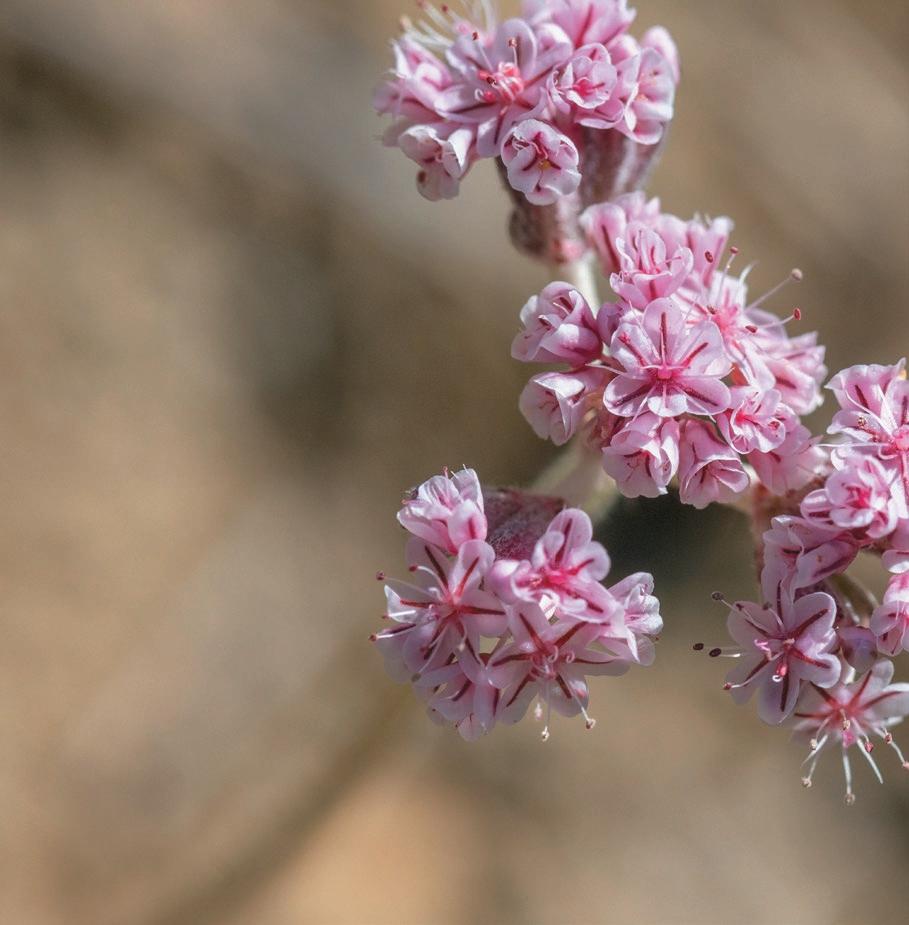 By Denise
By Denise


In early August of 2022, I was out on one of Save Mount Diablo’s conserved lands on a mission to remove invasive stinkwort (Dittrichia graveolens) from creek banks.
While scanning the area, my eyes locked in on a strange-looking plant growing out of a fresh shale landslide. It was confirmed to be Mount Diablo buckwheat (Eriogonum truncatum) by Heath Bartosh, founder of Nomad Ecology, rare plant specialist, and a former member of Save Mount Diablo’s Board of Directors.
This new discovery is now the third active population of Mount Diablo buckwheat in the world. The plant was presumed to be extinct for 69 years until 2005, when the first population was rediscovered on land protected by Save Mount Diablo. •
Read more about Denise’s discovery and the Mount Diablo buckwheat on our website at bit.ly/buckwht

At our 50th Anniversary gala, there was a major announcement. Four days earlier, the East Bay Regional Park District had optioned one of Save Mount Diablo’s top five priorities—the 768-acre Finley Road Ranch—for the appraised value of $11.4 million. Save Mount Diablo thanks the park district for its inspired leadership.
SUPPORTING
the park district in this acquisition project through advocacy with state and local elected officials and funding agencies. We have also donated $50,000 to help with the cost of the $200,000 option, which holds the property for three months and can be extended to late March 2023 for another $200,000.
With park district staff, we’re seeking funding from a variety of sources. We’ll need your support for this amazing opportunity.
The Black Hills and Riggs Canyon
The historic 6,500-acre Blackhawk Ranch once included 10 square miles from Wall Point in Alamo east to Finley Road. It included much of Mount Diablo’s steep chaparral-
covered Black Hills that now form the southern flank of the state park.
When the Blackhawk development was approved in the mid-1970s, for seven miles it blocked access to Mount Diablo and Morgan Territory Regional Preserve from the south.
The Black Hills and Blackhawk have continued to be a barrier for 50 years.
The Black Hills stretch east past Knobcone Point and Oyster Point along the southern edge of gorgeous, isolated Riggs Canyon. Riggs is the headwaters of Tassajara Creek. It drops from Highland Ridge, through the Black Hills at Finley Road Ranch and down the Tassajara Valley. Until the mid-1980s, Riggs Canyon was part of five miles of private ranches separating Mount Diablo State Park from Morgan Territory Regional Preserve.
The East Bay Regional Park District, California State Parks, and Save Mount Diablo have partnered since 1986 to protect 3,300 acres within Riggs Canyon, from state park to regional park, through seven different land acquisitions. We have not yet acquired a suitable location for a staging area with parking and restrooms.
The 768-acre Finley Road Ranch is large, spectacular, and has been a top priority for 20 years because it’s the missing piece, a limited opportunity to acquire land buffering the two parks with an ideal location for a new, low-elevation staging area. It’s the key to opening the canyon. Last fall it became available. If acquired, it will solve that access problem.
It's the most important land acquisition in the Mount Diablo area since 2013, when Save Mount Diablo protected its 1,080-acre Curry Canyon Ranch at the heart of Mount Diablo State Park and the East Bay Regional Park District optioned the 1,185-acre Roddy Ranch to create the new Deer Valley Regional Preserve.
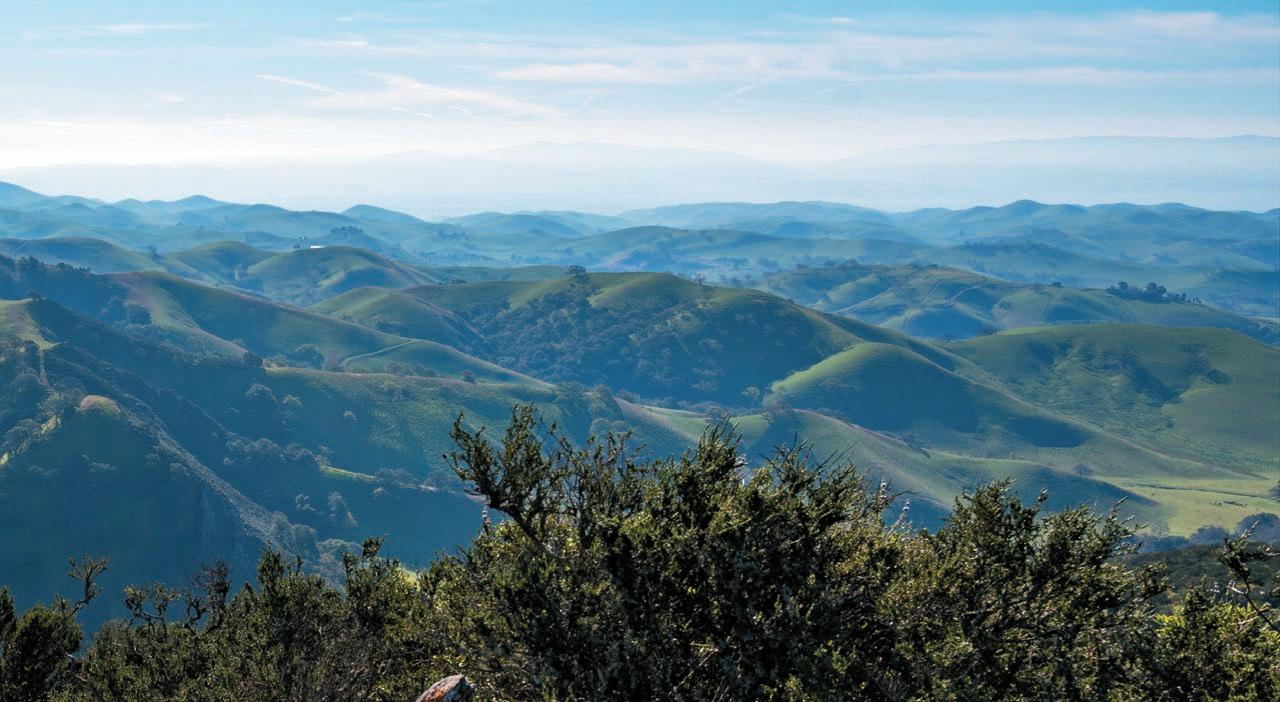
We have seven months to raise $11.4 million. The park district has bond funds for part and is seeking grants for the remainder.
Blackhawk paved the way
It’s taken a miracle to get here.
When the Blackhawk development was approved in the mid-1970s, it struggled until Bishop Ranch Business Park was built and began attracting corporate business headquarters. (Save Mount Diablo helped negotiate the Blackhawk development boundaries. About two-thirds of the 6,500-acre ranch was protected.) Waves of development followed in the Tri-Valley. The biggest was the massive Dougherty Valley development in 1990.
The reactions to traffic, congestion, and overloaded schools included Urban Limit Lines and slow growth movements in the county and every Tri-Valley city, and new regional transportation measures. All the development dramatically increased land values too.
Save Mount Diablo wasn’t involved in Dougherty Valley opposition. We
were much smaller then, and it was separated from the mountain by Blackhawk, but we helped pioneer growth control measures and Urban Limit Lines. As Riggs Canyon preservation began, we defended it from a quarry proposal and smaller subdivisions. Then having focused on the headwaters of Tassajara Creek inside Riggs Canyon, we became early defenders of the Tassajara Valley below Riggs Canyon. The long straight valley could be a natural boundary to block development.
Dougherty Valley had barely broken ground when developers to the east organized the “Tassajara Valley Property Owners Association” (TVPOA) proposal for 6,000 houses on 5,000 acres. TVPOA stretched from Mount Diablo State Park to include the entire Tassajara Valley all the way to the Alameda County line, including Finley Road Ranch. We and our allies, especially the park district, led opposition, and in 2000 the Urban Limit Line was tightened to exclude the Tassajara Valley (and the ranch).
Over 20 years, Save Mount Diablo and the district repeatedly defended
the growth boundaries, and major development proposals finally paused in the Tassajara Valley. We both supported the 125-unit Tassajara Parks project that adjusted the Urban Limit Line by 30 acres but would also create a 17,666-acre agricultural preserve with additional restrictions. It included a 727-acre land dedication and an extension of the Tassajara Creek/Ridge Trail to Tassajara Parks’ northern boundary—with Finley Road Ranch.
Together we and the park district have surrounded the Tassajara region with parks on 80 percent of its border. Finley Road Ranch could almost complete a “green wall” of parks and trail along the Urban Limit Line west of the Tassajara Valley.
How has all of this been possible?
It’s been a balancing act.
When we began working to protect the first parcels in the five-mile Mount Diablo to Morgan Territory corridor, the 800-acre Jones quarry property on the west side of Riggs continued on page 4
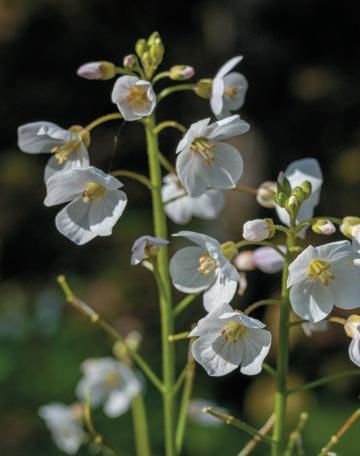
Canyon and the square-mile Marshall property to the east, the park district and state parks had very little money.
Bob Doyle, Save Mount Diablo’s President (and a park district employee) had enough influence to stop the Jones quarry, and we convinced the state to buy that piece. Photographer Bob Walker fell in love with the landscape on the Marshall property next door to Morgan Territory. He joined the Board of Save Mount Diablo and galvanized grassroots support for the park district. By hook and by crook, Marshall got funded too.
There was no money, but there was the possibility of a state park bond— we helped qualify it. The park district optioned two square mile sections, Perry and Cardoza, hopscotching west from Marshall across Highland Ridge and into Riggs Canyon. Save Mount Diablo started negotiating for the mouth of the canyon and, when a private buyer bought that piece, optioned the Morgan Ranch a mile north. Morgan could connect the two parks.
The Proposition 70 state park bond, which needed 50 percent to win, passed in June 1988 with over two-thirds vote in the East Bay. A few activists and organizations realized

we had a huge opportunity. Local measures also need two-thirds to pass. We had two months to create an East Bay Regional Park District funding measure and convince the park district’s Board to put it on the November ballot. It became EBRPD Measure AA.
A few people know the back story. Developers needed major transportation funds for projects countywide. They wanted a sales tax approved— Measure C. We wanted growth management and local bond funds for acquisition—Measure AA. Both measures needed a two-thirds vote. Neither could afford much organized opposition.
Both measures passed, barely. The county, cities, and business interests got transportation funding; conservationists got Urban Limit Lines and $225 million in park funding. With Measure AA, we not only had the money for the Mount Diablo to Morgan Territory corridor, but for park projects throughout the East Bay.
Within two years, the partners had completed the purchases of a checkerboard of corner-to-corner squaremile parcels—Marshall to Cardoza to Perry to Morgan to Jones—all the way across Riggs Canyon. Over the next 15 years, we’d fill in the gaps. But there was still no good place for parking.
Now’s our chance! •
TOGETHER WITH OUR PARTNERS in the Friends of Tesla Park coalition, we are following up on our advocacy work last year that protected the 3,100-acre Tesla Park area from damaging off-road use. In September 2021, our advocacy and the work of key legislators got AB/SB 155 approved.
Passage of this law prohibited the expansion of off-road activities into Tesla from neighboring Carnegie State Vehicular Recreation Area, protected Tesla in perpetuity, and identified it as a distinct unit of the state park system separate from Carnegie. Although this was a huge, and crucial, victory, we knew it was not the end. All the official planning for the Tesla area up to last year focused on destructive off-road use. With Tesla now protected, other ideas for the land would need to be drawn up and planned for.
This July as part of SB 154, $1 million was provided by the state legislature to fund specific planning for Tesla Park. With this appropriation, California State Parks was able to start the process of determining how Tesla will be classified and what uses for the park would be compatible with protecting its biodiversity and cultural sites.
Friends of Tesla Park is advocating for the land to be classified as a “reserve” to ensure its proper protection as an ecologic treasure in the northern Diablo Range. Though we are all familiar with state “parks,” like Mount Diablo State Park, California has just 16 reserves in the entire state park system.
According to official guidelines,
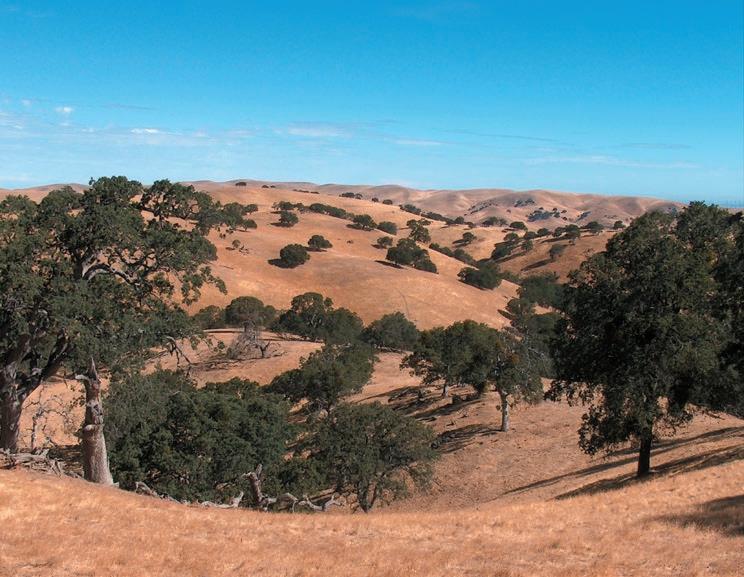
a (natural) reserve consists of “areas selected and managed for the purpose of preserving their native ecological associations, unique faunal or floral characteristics, geological features, and scenic qualities in a condition of undisturbed integrity. Resource manipulation shall be restricted to the minimum required to negate the deleterious influence of man.”
Tesla is incredibly rich in plant and animal diversity, including species that are listed as threatened or endangered and several sensitive habitats. Aside from the rare wildlife that can be found around Mount Diablo, such as California red-legged frog, California tiger salamander, and Alameda whipsnake, Tesla may be the closest place to Diablo where rare species like foothill yellow-legged frog and western spadefoot toad can be found. The area also holds many significant cultural artifacts and sites important to indigenous people in the region.
Given the extremely rich wildlife, plant, cultural, and historical features of Tesla, we think classifying it as a reserve makes sense to ensure that its natural and historical resources are given top priority for protection.
We are discussing our ideas with California State Parks staff and decision makers on the state parks
commission to get a clearer picture of what classifying Tesla as a reserve would entail.
Save Mount Diablo, along with Friends of Tesla Park, Sierra Club, California Native Plant Society, Audubon Society, Native American groups, and others will continue to work to ensure Tesla is fully protected. •

Save Mount Diablo and our partners are advocating that Tesla Park be designated a state reserve to give the highest level of protection to its incredible biodiversity and cultural resources.

Seeno companies have a long history of unethical, and even illegal, business practices, especially when it comes to the environment. Over the years, we’ve had to defend the Diablo region from many of their projects. Fortunately, we’ve won a recent victory in Pittsburg, and are continuing the fight in Concord.
In August 2022, the Pittsburg City Council followed a court order to rescind approvals for Seeno’s bad Faria project.
A little more than a year earlier, the council had unanimously voted to approve this 1,650-housing-unit development. It would have spread over more than 600 acres on top of the scenic Los Medanos hills separating Concord and Pittsburg. It would have been located above and next to the new Thurgood Marshall Regional Park, and negatively affected the park.
By providing very little description of the project or environmental review, the developer was trying to get project approvals prematurely.
For years, Save Mount Diablo, allied organizations, government agencies, and Pittsburg residents submitted hundreds of comments declaring that the project was premature. They noted that it suffered from inadequate environmental review; lacked a meaningful project description; and would negatively impact wildlife, scenery, city services, and the quality of life of Pittsburg residents.
In March 2021, Save Mount Diablo filed a legal challenge to Faria’s approval, and in February 2022, the Contra Costa Superior Court ruled in favor of our assertion that the environmental impact report for the Faria project violated the law.
When the Seeno development
company Discovery Builders requested a new trial, the court once again agreed with us and rejected the developer’s request, in a second victory for Save Mount Diablo, the environment, and Pittsburg residents.
We urge the Pittsburg City Council to rethink this project and come up with a revised version that addresses community and environmental concerns.
On the other side of the hills that we defended from Faria, on August 21, 2021, three Concord city councilmembers chose Seeno/ Discovery Builders and their partners as Master Developer for the massive 13,000-house, more than 2,300-acre Concord reuse project. In doing so, they made a terrible decision, and chose to stand in clear opposition to the will and best interests of Concord residents. More than 90 percent of the public comments the Concord City Council received specifically asked

With Seeno and their partners in charge [in Concord], what could have been a great project is now in danger of becoming a disaster for the entire region.
them to not choose Seeno and their partners as Master Developer.
Since 2005, Save Mount Diablo has worked together with partners and the City of Concord to envision how this project could benefit the community through a vibrant mix of jobs and affordable homes in walkable transit-oriented neighborhoods surrounded by protected open space. The 2012 reuse plan we helped create was a blueprint to achieve this. Although much of the open space acreage is now secure within the new Thurgood Marshall Regional Park, 900 acres of green space have not yet been delivered.
With Seeno and their partners in charge (they call themselves Concord First), what could have been a great project is now in danger of becoming
a disaster for the entire region. Seeno companies were rejected in a previous Master Developer selection process; made the weakest presentation in this current round; were clearly the weakest candidate based on city staff review of qualifications; refused to provide required financial information; have a sordid business history; and sued the city, the East Bay Regional Park District, and the Navy (the current owner of the city portion of the reuse project land). Despite all this, three of the five councilmembers still selected them.
In May, Seeno asked the city to expose itself to lawsuits, undermine its own bargaining leverage, and grant them property rights over the land before they’ve even met their first work deadlines. Just months after
they were selected, they’ve gone from saying they would do a fantastic job, to saying that the project is economically infeasible.
Though the city rejected their demands, the fact that they asked adds to the overwhelming evidence that Seeno and their business partners are untrustworthy, incapable of delivering on what they’ve said, and lack the ability and desire to live up to the public benefits committed to in the reuse project.
The City of Concord and Seeno have until the end of January 2023 to negotiate a term sheet (an outline for how the planning process will be done and various commitments and responsibilities). Until it’s approved, Seeno is technically not yet the actual Master Developer. The Concord City Council needs to drop Seeno, and the community needs to mobilize to make them do so. •
SAVE MOUNT DIABLO’S MANGINI RANCH EDUCATIONAL PRESERVE is officially open, free of charge, to public groups pursuing educational purposes (such as hiking groups, photography classes, schools, painting sessions, etc.). The reservation form is available online through Save Mount Diablo’s website.
The preserve is a 208-acre parcel acquired in 2007 largely thanks to the help provided by the Mangini family. Mangini Ranch neighbors Lime Ridge Open Space and offers more than four miles of trails that weave through many habitats including the largest northernmost desert olive stand, grasslands, stream corridors, oak woodlands, and chaparral.
With thanks to so many of you who volunteer your time
The preserve’s successful opening in late March 2022 is thanks to the hard work and many hours that volunteers and Save Mount Diablo staff have spent preparing the land. Save Mount Diablo’s Education Committee plays a very important role in creating educational opportunities and signage for the new preserve.
Students from Campolindo High School (through our Conservation Collaboration Agreement program) and volunteers from the Save Mount Diablo Trail Dogs were key in building and maintaining the 4.2 miles of trails throughout Mangini Ranch including the Galindo Creek loop that connects to Lime Ridge and the Crystyl Ranch Trail systems.
Numerous Eagle Scout projects have enhanced the use and enjoyment visitors can get out of the preserve, especially the picnic tables that the scouts built by the temporary shade structure and the larger bridge that crosses over Galindo Creek.
Volunteer docents have been an essential part of keeping the preserve open. Docents escort groups to provide access to the land when staff are unavailable, answer any questions, and close up afterward.
A large metal culvert was removed from Galindo Creek where it was obstructing the natural flow of the water.
A temporary shade structure, donated by the Diablo View Rotary Club, was set up in the heart of the property to provide an

The preserve has already been visited by community groups, homeschool students, painting and photography groups, hiking clubs, birding groups, the UC Berkeley Haas School of Business Alumni Network, and an AP environmental science class from Carondelet High School, among others.

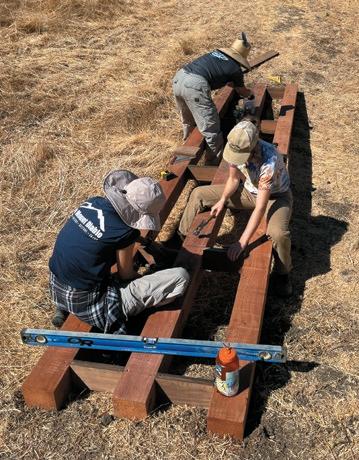

amphitheater-like space where visitors can rest or hold events. Save Mount Diablo is working with an architect to create plans for a permanent structure.
A footbridge was constructed by the Coralwood Drive entrance, with permitting from the California Department of Fish and Wildlife, using reclaimed redwood. This crossing will protect an ephemeral stream and endangered species habitat from further disturbance.
PG&E has spent the summer working on Mangini Ranch to move electrical lines underground in an effort to mitigate wildfires. Save Mount Diablo staff will add raptor hunting perches in place of the aboveground electrical lines for the predatory birds that use the land, particularly the American kestrel.
Mangini Ranch is a central location for American kestrels, which have been in decline due to various reasons such as habitat loss and climate change. Save Mount Diablo partners with The Kestrel Campaign to set up and monitor nest boxes on Mangini Ranch, many of which have
new Mangini Ranch
successfully been used to raise young kestrels. Staff has also partnered with the Lindsay Wildlife Experience to release numerous rehabilitated kestrels onto the land.
The Mangini Ranch Educational Preserve is one of many conserved lands where Save Mount Diablo is working to build trails. Big Bend (Marsh Creek 8), Marsh Creek 4, and Marsh Creek 6 are some of the other properties where the Trail Dogs and many more volunteers have helped build and maintain trails. •
Staff build a bridge for an ephemeral stream at Mangini out of reclaimed old-growth redwood.
WHILE VISITING several Save Mount Diablo properties, you might notice a growing population of colored flags and sky-blue tubes across the landscape. These visuals are part of our 10,000 Trees and Plants project— an effort to plant and protect 10,000 native plants in 10 years.
The project addresses climate change by planting and protecting native plants and trees. We focus on protecting volunteer tree seedlings, or seedlings that grow on their own from acorns released by mature trees. Volunteer trees have the genetics to survive in the landscape in which they grow and then do the hard work for us by putting a strong tap root into the soil, making it easy to identify them for protection. This way we are spending more time nurturing young seedlings by watering and protecting to prevent animals from nibbling on them. We also add native plants sourced from the Watershed Nursery to our restoration sites in the winter months when the rain and cooler temperatures help the plants settle in their new home.
During workdays, volunteers assemble and install tubes around seedlings before giving the trees a good drink of water. Volunteers and staff water the tree seedlings and native plantings every three weeks during dry months for the first five years to increase their chance of survival.
From blue oaks at Curry Canyon Ranch, to manzanitas atop the volcanic domes of Marsh Creek 5 and 6, and native shrubs and forbs at Big Bend and Marsh Creek 4, we are enhancing habitat through community engagement. With the hard work and support of our Diablo Restoration Team (DiRT), summer watering crew, and student and corporate groups, we have protected and planted more than 1,600 trees and plants! •
Want to help plant and protect native oaks, milkweeds, and other native plants this fall or winter?
Check out our Diablo Restoration Team workday schedule at bit.ly/10000plants.

WE FOUND DOZENS of monarch butterfly caterpillars on California milkweeds this year!
As a Park Ranger at Point Pinole, I monitored a monarch overwintering site. For years the butterflies sought eucalyptus trees and cool coastal air in their migration path. But recently their populations began to decline, and even disappeared in 2020.
This has been a pattern in the Bay Area. That’s why we’ve launched a project to bring monarchs back to the mountain. We’re working with volunteers, students, and staff to search our land and Mount Diablo State Park for both narrowleaf and California milkweed, the main host plants for the butterflies.
We made GIS maps of every plant we found and have used the maps to collect seeds on our properties and to obtain a permit to collect seeds found in Mount Diablo State Park.
We took the seeds to the Watershed Nursery to be propagated. We’ll plant them on the slopes around the mountain to help build habitat for these incredible pollinators, and to strengthen wildlife corridors and biodiversity around the mountain.
On California milkweeds, we’ve counted dozens and dozens of caterpillars and have seen their butterflies fluttering in the canyons. We are excited and hopeful to be assisting this special animal. •
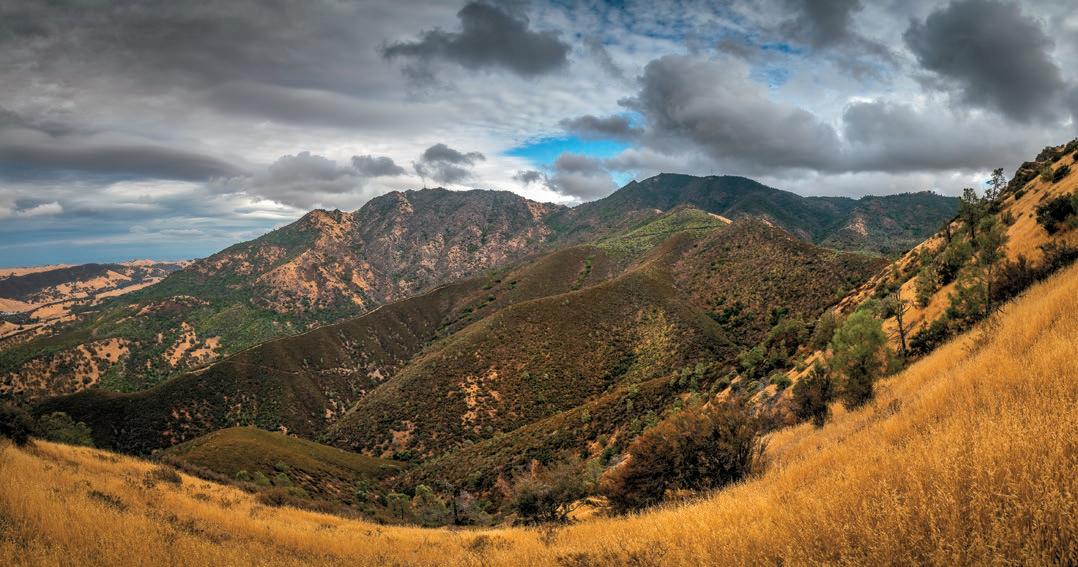
We are amidst our 50th anniversary celebrations, so it is a time to reflect and think ahead.
WHEN SAVE MOUNT DIABLO WAS FOUNDED on December 7, 1971, Mount Diablo was home to just one 6,788acre park, Mount Diablo State Park. From the start, our co-founders, Mary Bowerman and Art Bonwell, and supporters were thinking ahead by realizing more of Mount Diablo and its other connected open spaces needed to be protected in a growing Bay Area.
Thanks to that thinking ahead, there are now more than 50 parks and preserves around the mountain north of Altamont Pass, totaling over 120,000 conserved acres. Mount Diablo and its foothills are now one of the Bay Area’s most significant assemblages of protected natural lands and wildlife habitats.
Thinking ahead, we can see a few major issues that will require attention, and we have started that work.
The United Nations Secretary General has stated, “Climate change is the defining issue of our time—and we are at a defining moment.” Save Mount Diablo is working to address the climate crisis. For example, we created and adopted a Climate Action Plan to guide our actions. It includes chapters on how we must adjust and improve our advocacy and policy work, our education programs, our finance work, our land acquisition efforts, our organizational carbon footprint, and our stewardship work.
We also face a biodiversity crisis. Renowned biologist E.O. Wilson noted that the rate of extinction today is estimated to be a thousand times what it should be under natural selection. Recognizing this and the climate crisis, Save Mount Diablo expanded its geographic area of focus into four additional counties
to protect Mount Diablo’s connection to its sustaining Diablo Range and the integrity of the whole. The Diablo Range is a biodiversity hotspot, and working to protect more of it will support biodiversity and help keep the system whole and resilient to better deal with, and adjust to, the stresses of the climate crisis.
As Paul Hawken writes in his book Regeneration: Ending the Climate Crisis in One Generation, “Our planet and youth are telling us the same story. Vital connections have been severed between human beings and nature. . . . This disconnection is the origin of the climate crisis, it is the very root—and it is where we discover solutions and actions that can engage all people, regardless of income, race, gender, or belief.”
Save Mount Diablo has developed a “Connect, Educate, Serve, and Diversify” approach for its expanded education programs (creating and protecting more trail corridors, offering meditation in nature, teaching students about the climate crisis, providing volunteer stewardship opportunities, offering bilingual programs, etc.). When more people are included and involved, and we directly develop our love of nature in the outdoors, then learn how it is threatened and can be helped, and then are empowered and provided ways to act and serve nature—we become unstoppable.
Together, we continue our tradition of thinking ahead as we work to address the climate and biodiversity crises, and get more people meaningfully connected to nature, while also working to be more inclusive, diverse, and equitable. •
OVER THE COURSE OF THREE YEARS , we have been busy strengthening wildlife corridors around the greater Mount Diablo area as well as our partnership with the Lindsay Wildlife Experience, in both building habitat for at-risk species like the American kestrel and fortifying habitat with keystone species like the California ground squirrel.
Utilizing partnerships with The Kestrel Campaign and the Mary Bowerman Science and Research Committee, we have been able to install 37 kestrel boxes around the mountain, providing habitat for these cavity nesters, many of which have had active nesting pairs that fledge two to five young raptors each.
We’ve placed wildlife cameras on
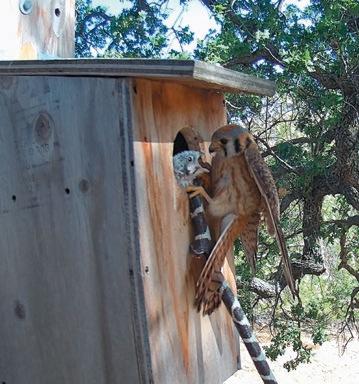
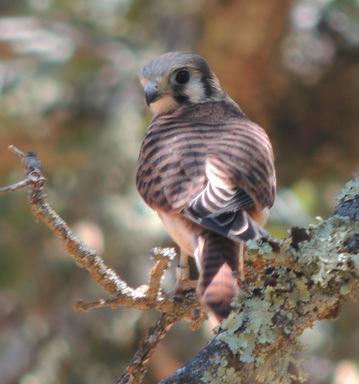
some of them to monitor and understand food exchange patterns, prey differentiation, and the time when some of these young raptors leave the box. We’ve been amazed by some of the animals these small raptors bring to the nest box, especially the image of the California kingsnake!
With Lindsay Wildlife Experience, we’re helping release rehabilitated and orphaned kestrels into the greater Mount Diablo area. This year we assisted in the release of nine kestrels and created habitat for at least 24 fledglings on the boxes that we moni-


tored, providing the mountain with more than 90 kestrels total in the past three years.
We have also continued working with Lindsay’s squirrel team, using our protected lands as release sites for California ground squirrels. This year we partnered with them to release 12 ground squirrels in the valley at Curry Canyon, continuing to strengthen the wildlife corridor of the area and provide habitat for species like California tiger salamander, red-legged frogs, kingsnakes, coyotes, American badgers, bobcats, and golden eagles. •
Tuesday Bentley joined the staff in 2022 as our new Accounting & Administrative Associate. Tuesday has seen her share of landscapes, her favorites being places with water or beaches. She spent her early youth in San Jose, California—visiting Santa Cruz, Monterey, and the nearby redwood forests. She has been in the accounting and administration field for more than 10 years. She enjoys spending time with her family in the outdoors and is excited to fulfill the Save Mount Diablo mission.
Brit Hutchinson joined the team as Event Coordinator in 2022, bringing over a decade of event experience to Save Mount Diablo. Originally from Illinois, she was raised traveling the US and developed an early appreciation for the importance of protecting open space. After graduating and working in Chicago for several years, she followed her dream of exploring the world with a backpack. Immersive travel exposed her to fragile environments across the globe, instilling her determination to make a positive impact on our planet—which she now passionately applies at Save Mount Diablo.

Sue Ohanian recognized right away that volunteering with Save Mount Diablo made sense: “It was a natural fit—I hiked on the mountain, lived next to it, and believed it needed to be preserved and protected!”
SUE SPENT her early volunteer days offering critical extra support in the Save Mount Diablo office. Her involvement quickly grew, and she resourcefully organized an artist-focused fundraiser and began securing auction donations for the annual Moonlight on the Mountain gala. She then joined the Development Committee and applied her professional marketing experience to
supporting Save Mount Diablo’s land conservation work.
In 2012, Sue joined the Board of Directors and played a key role in editing Save Mount Diablo’s application for national accreditation from the Land Trust Accreditation Commission. She served six years on the Board and is now a member of the Land Committee, where she continues to support Save Mount Diablo’s
landowner outreach and strategic acquisition activities.
Over many years, and through her diverse roles, Sue has developed a deep respect for Save Mount Diablo and its ability to advance its conservation mission. “It says a lot when you’ve been in the weeds of an organization, seen how well it functions, and believe fully in what it can accomplish.”
This confidence, and a commitment to Save Mount Diablo’s conservation mission, are what inspired Sue and her husband, Steve, to join Save Mount Diablo’s Legacy Circle. “We chose to include Save Mount Diablo as a beneficiary in our estate plan because it is an impactful organization in the Bay Area for the plants, animals, and people who live here today and in the future.”
A legacy gift was fitting because the continuation of Save Mount Diablo’s conservation work is personally meaningful to Sue. Mount Diablo is her symbol of home and a unique landmark that she regularly encourages others not to take for granted.
Thanks to their thoughtful plans and place in the Legacy Circle, Sue and Steve Ohanian are helping Save Mount Diablo protect the land, plants, and wildlife of Mount Diablo, along with its foothills and sustaining Diablo Range, long into the future. •


WITH YOUR GENEROUS SUPPORT, we raised more than $593,000—critical funds that will allow us to continue our work preserving the natural lands and wildlife still at risk.
More than 540 community members and elected officials came together—in person again, finally!—at China Wall in Mount Diablo State Park to celebrate our successes of the past 50 years. They raised their paddles in support of Save Mount Diablo’s important conservation
work to preserve land on and around Mount Diablo and connecting to its sustaining Diablo Range.
We are grateful to our presenting sponsor, Concord Feed; all of our other generous event sponsors; our live, silent, and online auction donors and bidders; our committed volunteers; and our guests, who made this year’s Moonlight on the Mountain 50th Anniversary gala such a wonderful and successful event.
Thank you


Charla Gabert & David Frane








Dana & Dave Dornsife


Jeanne Thomas

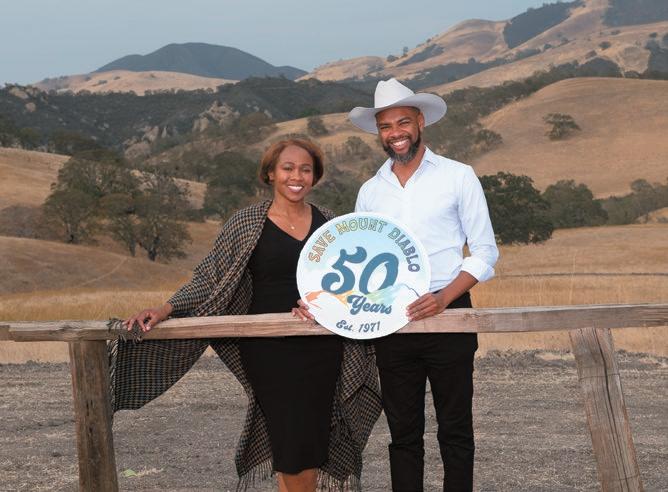

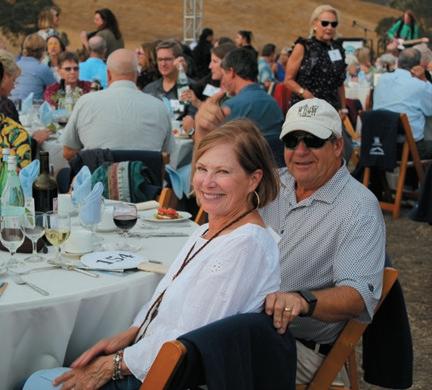
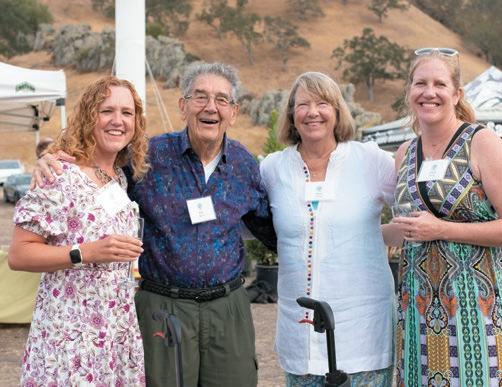
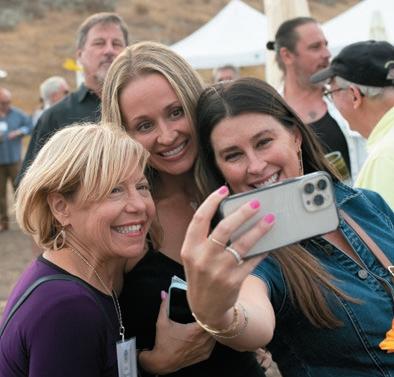




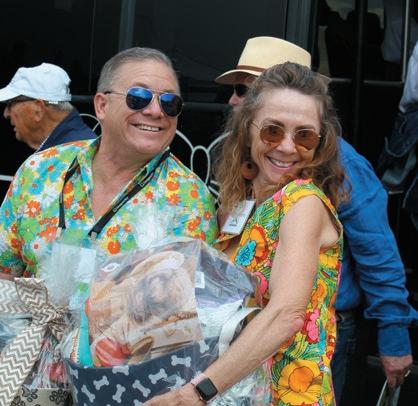

















TRIBUTE GIFTS and donations made in honor of or in memory of loved ones between January 1 and June 30, 2022 are listed below.
Thank you to all of our supporters. Your generosity preserves, defends, and restores the mountain for all of us to enjoy!
Tribute names are indicated in bold. An asterisk (*) denotes donors who make monthly tribute gifts.


7 Hills Hiking Club
Usha K. Vedagiri & John M. Baas
Subramanian Venkiteswaran
Richard Backman
Edmund Clausen
Burt Bassler
Barbara & Michael Monsler
Bette & Jim Felton
Herb & Margaret Eder
Barbara & Michael Monsler
Juan Pablo Galván Martínez
Kristen Wick
Leona Han
James Han
Dan Harvey
Leslie & Dave Morris
Alan Kalin
Nicola Place & Chris Beeson
John H. Kiefer
Patricia Neumeyer
Steve Kliegman
Ben Hamburg
Russ & Cyndie Harrison
Holly Hartz & Jack Davis
Kitty & Harvey Rudman
Lisa Radomski
Kathy & Bill Moran
Janet Zovickian
Islay Morrison
Scott & Claudia Hein
Eric Niles
Newell & Janis Arnerich
Denise Rousett
Newell & Janis Arnerich
Hazel Sasser
Clif Bar & Clif Bar Family Foundation
Haley Sutton
Ruth & Joel Willen
Edward Sortwell Clement, Jr.
Elise Cutler
Curtis Swanson
Noel Swanson
Jeanne Thomas
Joan S. Armstrong
Deborah Wechsler
Zoe Francesca
Denise Wight
Sandy Gess

Kim Bailey
Nancy Lowe
Alan Butts
Jeanne Thomas
Frank Colombo
Michael Colombo
Sheryl Cummins
Sharon Cummins
Constance Doty
Adriane & Barry Bosworth
Scott Dowd
Jane Dubitzky
Paul Ernst
Joan Ernst
Norval Fairman
Mary Fairman
Jim Felde
Rose McKinnon
Fred Sullivan
Anna L. Ferri
Larry Ferri*
Lowell Froker
Mary Louise & Bruce Wilson
Charles Gabert
Mark Gulner
Madelen Gill
Lee Gill
Patti F. Goldsmith
John Fingarson
Beatrice Gordon
Gaynel Wilhoyte
Jack Harper
Donna Harper
Daniel Henry
Carol Henry
Dean W. Jackson
Evelyn Hollidge
Lynward Johnson
Gary & Carolyn Snyder
Brian Kruse
Margaret Kruse*
Maxine
Anonymous
Tom Meyer
Frances Gunther
Janet Montes
Terry & Glenn Gonzalez*
Tom H. Piatt
Sherry Piatt
James Rease Cole
Spalding Rooker Ashley
Lois Lybeck Carelli
Rick & Laura Cioppa
Susan de Rubira
Robert Doyle & Tina Batt
David Kwinter
John & Beverly Prosek
Morgan Rease
Steven Sharp
Curtis & Christine Swanson
Jerry Russell
Karen Froming
Karen Sickenberger
Margaret Kruse*
Vivian Sweigart
Terry & Glenn Gonzalez*
Virginia Taduran
Frederika Villacarlos
Steve Thornton
Kari Mullican
Sally Tinsley
Stephen & Merle Baruch
Gary & Tina Kaufmann
Doris Hillery Dana Tobias
Joyce Hambrick & Loren Bauman
Tom
Dr. Chris & Catherine Jones
Susan Tullis
John Tullis
Thomas S. Watt
C-A Tucker-Watt
Barbara White
Ingrid Wood

We

Monthly giving is one of the easiest and most effective ways to give.
• You can start, change, or stop at any time.
• Your dependable support helps our team respond to unexpected conservation opportunities and also allows us to budget and plan for long-term projects.
• With no reminders or extra mail, monthly giving is green giving, and more of your contribution goes directly to supporting conservation in your community.
more and sign up at bit.ly/SMDgive.
TEL: 925-947-3535
www.savemountdiablo.org

IF YOU’RE 70½ YEARS OR OLDER, supporting Save Mount Diablo with a gift through your individual retirement account (IRA) may be a great way to give.
IRA gifts offer a variety of benefits for you and the charities you support. A charitable distribution from your IRA (often called a “charitable rollover” or “qualified charitable distribution” or “QCD”) is an easy way to give from your appreciated assets.
When these gifts are made directly from your IRA to a charity, the distribution is not included in your taxable income. This means you can avoid federal income tax that would otherwise be due on IRA withdrawals. Plus, any gifts you make directly from your IRA will be counted toward your annual required minimum distribution.
To qualify:
• You must be 70½ or older at the time you make your gift
• The transfer must go directly from your IRA to Save Mount Diablo to avoid income tax obligations
• Your total charitable giving from your IRA cannot exceed $100,000 annually
• You cannot receive anything of value in return for your gift
To learn more, please visit bit.ly/irasmd or contact Samantha Kading at skading@savemountdiablo.org or 925-949-4513.
Because Save Mount Diablo cannot offer legal or tax advice, we recommend that you work with qualified financial and legal advisors before making your gift.
“My dream is that the whole of Mount Diablo, including its foothills, will remain open space . . . that the visual and natural integrity will be sustained.”
DR. MARY L. BOWERMAN